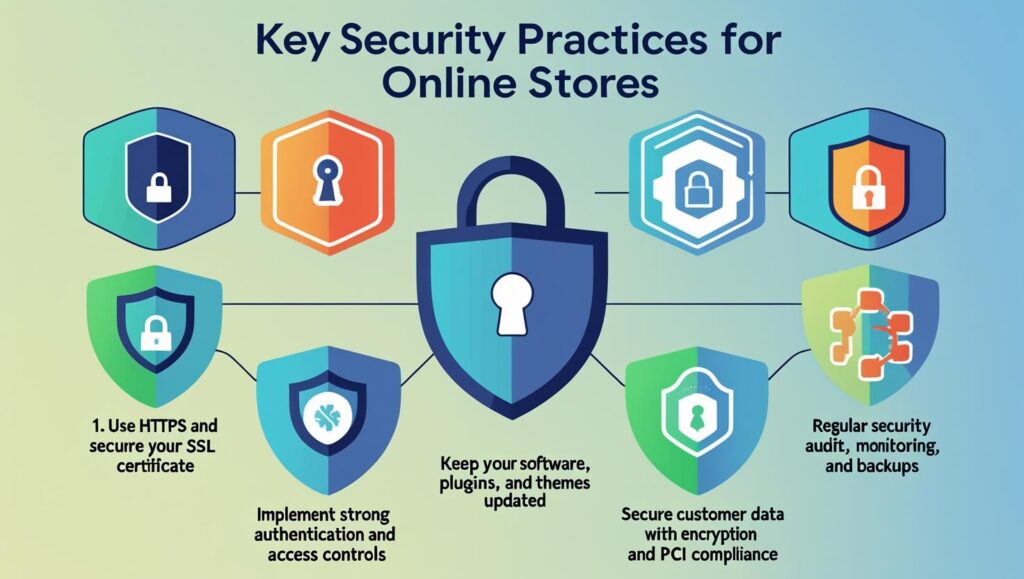An online store is more than just a convenience for people– in today’s digital marketplace, it is the core of many businesses. Many big brands function online rather than having a physical store. And those that do have physical stores also have an online store for the convenience of those that can’t shop physically.

But as there was a rise in eCommerce, a 71% rise in cybercrimes were also recorded. This is why online retailers need to take proactive steps in protecting not only their site but also their customers’ data, since this can result in not only sales and revenue loss but also a stain to their brand and loss of customer’s trust in the company.
So, how can you keep your online store and your data safe and secure?
Here are the top 5 security tips that every eCommerce store should implement– whether they are just preparing their launch or scaling their business to thousands of customers.
1. Use HTTPS and Secure Your SSL Certificate
Imagine you are shopping online and just as you’re about to enter your credit card details on the website, you notice the browser showing “Not secure”, would you still trust them? Of course not! Many customers will not be entering their important information just like that and rightfully so.
That’s where HTTPS (HyperText Transfer Protocol Secure) comes into play. HTTPS will encrypt all the data that is being exchanged between the customer’s browser and the website, making it harder for attackers to steal sensitive information.
The SSL (Secure Socket Layer) certificate encrypts data both in store and in transit and authenticates the user’s identity. Here is how you can implement an SSL Certificate:
- Obtain an SSL certificate from a trustworthy certificate authority, such as Comodo or Let’s Encrypt.
- Make sure that HTTPS is used to serve all of your store’s pages, not only the checkout page.
- To enforce HTTPS connections, use HTTP Strict Transport Security (HSTS).
Many big eCommerce companies like Shopify, WooCommerce and BigCommerce would include SSL Certificates by default to ensure that it is always active.
2. Keep Your Software, Plugins and Themes Updated
Keeping your software and plugins updated may sound like an obvious thing to do but believe it or not many do not implement this step. It is best to know that outdated systems are the leading cause of cyberattacks.
Hackers constantly search websites for weaknesses in third-party extensions, themes, CMS platforms (such as WordPress), and out-of-date plugins. Especially when you run online eCommerce sites like Shopify, WooCommerce and Wix, unpatched plugins can be a major cause of risk for your business.
Best practices would be: –
- When feasible, enable automated updates; otherwise, schedule manual updates on a regular basis.
- Make use of reliable themes and plugins from developers you can trust and who have a history of frequent updates.
- Unused extensions and plugins should be deleted. They pose a needless risk.
Keep an eye out for any updates on the platform’s dashboard and make sure to update your site at least once a week.
And if you are using a custom CMS or a self-hosted platform, ensure that your development team is always aware of the latest security fixes.
3. Implement Strong Authentication and Access Controls
Using weak passwords and shared logins is basically like giving an open invitation to cyber-attackers. Strong and secure authentication is a must for both you and your customer.
Here are the following steps on what to do: –
- All staff and admin accounts should have strong passwords that combine capital and lowercase letters, digits, and symbols.
- For administrator access, use two-factor authentication (2FA). This easy procedure provides an additional degree of security.
- Give employees access to only the areas of the store they require by using role-based access.
Another way to consider this is that customer billing information is not required or necessary for your marketing staff to have access to. Segment access appropriately.
4. Secure Customer Data with Encryption and PCI Compliance
If your eCommerce platform works in such a way that you have to store, handle or process debit card, credit card or any type of payment information, then compliance with PCI DSS (Payment Card Industry Data Security Standard) is non-negotiable.
PCI Compliance rules must be followed as they protect the customer’s credit card details. Some of those essential steps are: –
- Don’t keep private credit card information on your servers.
- Make use of reputable payment gateways that manage card data and guarantee PCI compliance, such as Square, PayPal, or Stripe.
- Use AES-256 or another robust encryption standard to encrypt all customer data that is stored.
Additionally, be open and honest about your data privacy guidelines. Consumers value knowing how their information is handled and safeguarded.
PCI Compliance is automatically handled by platforms like Shopify and Wix. But if you are using a custom setup then it is your responsibility to ensure the PCI Compliance. To maintain the security and lower the danger of data breaches of your company, make sure that your payment systems and procedures adhere to these guidelines.
5. Regular Security Audits, Monitoring, and Backups
Your store’s digital doors may have the toughest locks, but that doesn’t mean you can rest easy. Similar to how you wouldn’t leave a physical store unattended at night, your online store also requires regular inspections and early warning systems in order to remain secure.
Here is what to implement: –
- To find vulnerabilities, do routine security audits.
- To check for malware, open ports, and out-of-date components, use automated programs or consult professionals.
- Install real-time monitoring software (such as SiteLock, Cloudflare, or Sucuri) to identify questionable activity.
- Make regular backups of the databases and files in your store. Test recovery from time to time and store them elsewhere or in the cloud.
There is no “set it and forget it” approach to security. You can create a robust eCommerce platform that can withstand cyberattacks and flourish in a trusting environment by conducting frequent audits, maintaining continuous monitoring, testing backups, and tracking activity.
Conclusion!
Security is more like an investment rather than a cost in this case. If customers know and are ensured that their personal information is safe, they will surely be able to shop more often with peace of mind. They may also recommend your brand to many other people and so on.
There is no compromise on security whether you own a small local shop or an international eCommerce business. This is essential if you want to grow your business and ensure customer satisfaction.
Need Help with Securing Your Online Store?
It is confusing for non-technical people to implement these security protocols to their platforms. Therefore, companies like Largify Solutions, a leading Pakistani tech firm, provide cybersecurity and end-to-end eCommerce development services.
They assist in making sure your store is secure and compliant with everything from penetration testing to custom firewalls. You can be in a far-off foreign country, and Largify Solutions will still present you with satisfactory results.

